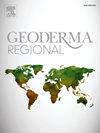Organic carbon stocks across various land use systems in Sandy Ultisols and Oxisols in Brazil
IF 3.3
2区 农林科学
Q2 SOIL SCIENCE
引用次数: 0
Abstract
Soil organic carbon (SOC) is a major carbon pool that can be easily affected by land use change, especially in tropical humid sandy soils, where organic decomposition is fast and SOC stabilization is weak. Here, we assessed SOC stocks in coarse-textured Oxisols and Ultisols under six contrasting land uses in western São Paulo, Brazil, an area marked by warm temperatures, within the Atlantic Rainforest biome. Soils were sampled for bulk density and SOC content to a 1-m depth in areas under a) primary native forest, b) native forest restoration, c) pastures, d) sugarcane, e) cassava, and f) annual crops. Even under primary forests, SOC stocks were low relatively to other Brazilian soils under cooler climates and with finer textures, and the effect of land use changes varied with soil type. In both soil types, the lowest SOC stocks occurred under cassava cultivation, a traditional indigenous crop with low soil coverage and which requires intensive soil disturbance for harvesting. In Ultisols, forest restoration and sugarcane presented the highest SOC stocks, whereas in Oxisols, the highest stocks occurred under primary forests and pastures, suggesting that gramineous perennial crops with little soil disturbance are effective in preserving or even sequestering SOC in these areas. When only primary forests are compared, SOC stocks in Oxisols were higher than in Ultisols, probably due the effect of higher soil bulk densities on the Ultisols, rendering root development and thus SOC accrual in subsoil more difficult.

巴西沙质Ultisols和Oxisols不同土地利用系统的有机碳储量
土壤有机碳(SOC)是易受土地利用变化影响的主要碳库,特别是在有机分解快、SOC稳定性弱的热带湿润沙质土壤中。在这里,我们评估了在大西洋热带雨林生物群系中,巴西圣保罗西部一个以温暖的温度为特征的地区,在六种不同的土地利用方式下,粗质Oxisols和Ultisols的SOC储量。在a)原始原生林、b)原生林恢复、c)牧场、d)甘蔗、e)木薯和f)一年生作物类型的土壤中取样1 m深度的土壤容重和有机碳含量。即使在原始林下,土壤有机碳储量也低于其他气候较冷、质地较细的巴西土壤,而且土地利用变化的影响因土壤类型而异。在这两种土壤类型中,种植木薯的土壤有机碳储量最低,而木薯是一种传统的本土作物,土壤覆盖度低,需要强烈的土壤干扰才能收获。土壤中有机碳储量最高的是森林恢复和甘蔗,而土壤中有机碳储量最高的是原生林和牧场,表明土壤扰动较小的禾本科多年生作物对土壤有机碳的保存甚至吸收是有效的。当只比较原生林时,氧化土的有机碳储量高于终极土,这可能是由于更高的土壤体积密度对终极土的影响,使根系发育和土壤有机碳积累在地下土壤中更加困难。
本文章由计算机程序翻译,如有差异,请以英文原文为准。
求助全文
约1分钟内获得全文
求助全文
来源期刊

Geoderma Regional
Agricultural and Biological Sciences-Soil Science
CiteScore
6.10
自引率
7.30%
发文量
122
审稿时长
76 days
期刊介绍:
Global issues require studies and solutions on national and regional levels. Geoderma Regional focuses on studies that increase understanding and advance our scientific knowledge of soils in all regions of the world. The journal embraces every aspect of soil science and welcomes reviews of regional progress.
 求助内容:
求助内容: 应助结果提醒方式:
应助结果提醒方式:


